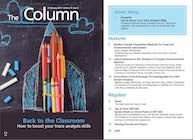Latest Advances in the Analysis of Complex Environmental Matrices
The Royal Society of Chemistry’s Environmental Chemistry Group, Water Science Forum, and the Separation Science Group Joint Meeting will be held on Friday 22 February 2019 in the Science Suite of the Royal Society of Chemistry, in Burlington House, Piccadilly, London, UK.
cienpiesnf/stock.adobe.com

The Royal Society of Chemistry’s Environmental Chemistry Group, Water Science Forum, and the Separation Science Group Joint Meeting will be held on Friday 22 February 2019 in the Science Suite of the Royal Society of Chemistry, in Burlington House, Piccadilly, London, UK.
The analysis of established and newly developing pollutants in environmental matrices such as water and sediment, air, and biota can be highly complex because of the low concentrations of pollutant and the huge matrix effects in each particular sample. Developments continue each year in all of the steps involved in the analysis-sampling, clean-up methods, and final analysis, followed by mass spectrometry (MS) and computational data analysis of the vast amount of analytical information produced.
The current one-day meeting Latest Advances in the Analysis of Complex Environmental Matrices is to be held at the Royal Society of Chemistry, Burlington House, London, UK, on Friday 22 February 2019 and highlights the most recent developments in analytical techniques. This meeting is the fourth in a series of biennial meetings started jointly by the RSC’s Environmental Chemistry Group and Separation Science Group and now joined by the Water Science Forum. Speakers are international and national experts from academia and industry.
The meeting will begin with a discussion from Leon Barron (King’s College London, UK) on the role of analysis and machine learning in ecotoxicology for aquatic invertebrates. The importance of the need for computational techniques is a major theme in the symposium with the keynote lecturer, Emma Schymanski (University of Luxemburg, Luxemburg), introducing environmental cheminformatics as a means to identify unknown chemicals and their effects. The talk will cover European, US, and worldwide community initiatives to help connect knowledge on chemistry and toxicity with environmental observations. Two of the presentations will discuss the analysis of plastics and pharmaceuticals, two major current environmental concerns, as pollutants. Caroline Gauchotte Lindsay (University of Glasgow, Glasgow, UK) will discuss micro- and nano-plastic pollution of freshwater and wastewater treatment systems and Alistair Boxall (University of York, York, UK) will review temporal and special variation in pharmaceutical concentrations in urban river systems.
Sampling is the start of any analytical procedure. Laura McGregor (SepSolve Analytical Ltd., UK) will discuss enhanced confidence in river quality monitoring necessary for EU and other regulations using passive sampling and twoâdimensional gas chromatography (GC×GC) with time-of-flight mass spectrometry (TOF-MS). Gary Fones (University of Portsmouth, Portsmouth, UK ) will discuss the analysis of polar pollutants in river catchments by liquid chromatography (LC) and TOF-MS after passive sampling. The advantages of automated sample preparation and GC–MS for semivolatile organic compounds and pesticide analysis will be covered by John Quick (ALS Environmental Ltd., UK). Developments in atmospheric analysis will be described by Katie Read (University of York, York, UK) in her presentation covering GC×GC–MS for remote monitoring at the Cape Verde Atmospheric Observatory. Ion chromatography (IC) will be covered in the final presentation of the day by WaiâChi Man (Thermo Fisher Scientific, UK), who will discuss its use with MS for the measurement of problematic herbicides in water.
In addition to the nine presentations there will also be a manufacturers’ exhibition.
Further details can be found on: http://www.rsc.org/events/detail/36535/latest-advances-in-the-analysis-of-complex-environmental-matrices

Characterizing Plant Polysaccharides Using Size-Exclusion Chromatography
April 4th 2025With green chemistry becoming more standardized, Leena Pitkänen of Aalto University analyzed how useful size-exclusion chromatography (SEC) and asymmetric flow field-flow fractionation (AF4) could be in characterizing plant polysaccharides.
Advances in Non-Targeted Analysis for PFAS in Environmental Matrices
March 27th 2025David Megson from Manchester Metropolitan University in Manchester, UK, spoke to LCGC International about the latest developments in non-targeted analysis (NTA) of per- and polyfluoroalkyl substances (PFAS) in environmental matrices based on a recent systematic review paper he has collaboratively published (1).













